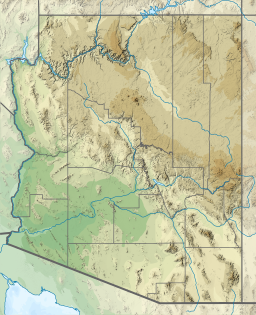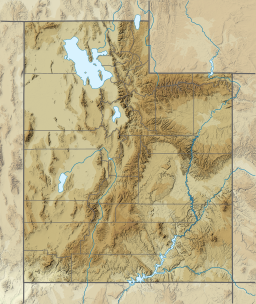
Back بحيرة باول Arabic Паўэл (возера) Byelorussian Llac Powell Catalan Lake Powell (tubiganan sa Tinipong Bansa, Utah, Kane County, lat 37,32, long -110,81) CEB Lake Powell Danish Lake Powell German Lago Powell Spanish دریاچه پاول Persian Lac Powell French Lago Powell Galician
| Lake Powell | |
|---|---|
 | |
| Location | Utah and Arizona, United States |
| Coordinates | 36°56′10″N 111°29′03″W / 36.93611°N 111.48417°W (Glen Canyon Dam) |
| Type | Reservoir |
| Primary inflows | |
| Primary outflows | Colorado River |
| Catchment area | 280,586 km2 (108,335 sq mi) |
| Basin countries | United States |
| Managing agency | National Park Service |
| Built | September 13, 1963 |
| Max. length | 186 mi (299 km) |
| Max. width | 25 mi (40 km) (maximum) |
| Surface area | 161,390 acres (65,310 ha) |
| Average depth | 132 ft (40 m) |
| Max. depth | 583 ft (178 m) |
| Water volume | |
| Residence time | 7.2 years |
| Shore length1 | 3,057 km (1,900 mi) |
| Surface elevation | |
| Website | www |
| 1 Shore length is not a well-defined measure. | |
Lake Powell is a reservoir on the Colorado River in Utah and Arizona, United States. It is a major vacation destination visited by approximately two million people every year. It holds 24,322,000 acre-feet (3.0001×1010 m3) of water when full, second in the United States to only Lake Mead - though Lake Mead has fallen below Lake Powell in size several times during the 21st century in terms of volume of water, depth and surface area.[citation needed]
Lake Powell was created by the flooding of Glen Canyon by the Glen Canyon Dam, which also led to the 1972 creation of Glen Canyon National Recreation Area, a popular summer destination of public land managed by the National Park Service. The reservoir is named for John Wesley Powell, a civil war veteran who explored the river via three wooden boats in 1869. It lies primarily in southern Utah, with a small portion in northern Arizona.
Lake Powell is a water storage facility for the Upper Basin states of the Colorado River Compact (Colorado, Utah, Wyoming and New Mexico). The Compact specifies that the Upper Basin states are to provide a minimum annual flow of 7,500,000 acre-feet (9.3 km3) to the Lower Basin states (Arizona, Nevada, and California).
According to US Geological Survey and the Bureau of Reclamation report, in addition to water loss, Lake Powell faced an average annual loss in storage capacity of about 33,270 acre-feet, or 11 billion gallons, per year between 1963 and 2018 because of sediments flowing in from the Colorado and San Juan rivers. Those settle at the bottom of the reservoir and decrease the total amount of water the reservoir can hold.[2] Environmentalists have pushed to drain Lake Powell and restore Glen Canyon to its natural, free-flowing state.[3][4][5]
- ^ a b c d "Lake Powell Water Database".
- ^ Rachel Ramirez (21 March 2022). "Not only is Lake Powell's water level plummeting because of drought, its total capacity is shrinking, too". CNN. Retrieved 2022-08-04.
- ^ Cite error: The named reference
:0was invoked but never defined (see the help page). - ^ Cite error: The named reference
:1was invoked but never defined (see the help page). - ^ Cite error: The named reference
:2was invoked but never defined (see the help page).


